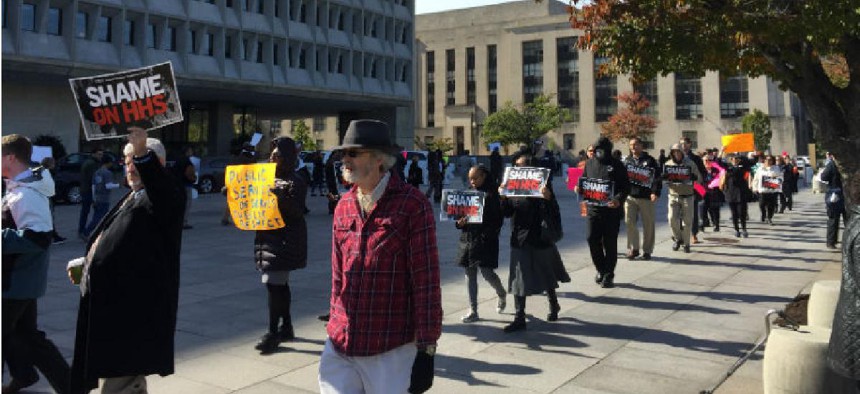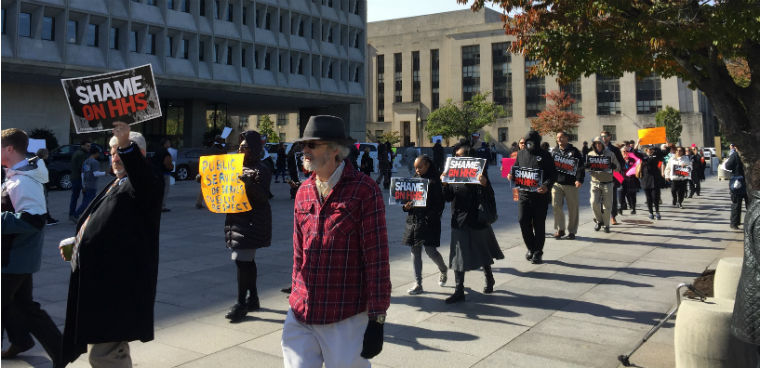HHS employees picket collective bargaining breakdown

Frustrated by the break in contract negotiations, federal employees and union members picketed outside the Department of Health and Human Services.

Federal employees and union members picketed outside the Department of Health and Human Services Oct. 25 to protest a breakdown in contract talks.
After two days of collective bargaining, HHS negotiators made a final offer to unions before declaring an impasse in July, kicking the decision to the Federal Service Impasse Panel.
NTEU president Tony Reardon said the purpose of the picket was "to engage our NTEU members and federal employees that work at HHS… but also to send a clear message to [HHS Secretary Alex] Azar that employees are fed up."
HHS is pushing tough leave and telework policies, said NTEU chapter 250 President April Goggans. But negotiations about where the department would be willing to give on its interests "didn't even get that far," she said.
Across the two days of negotiations, "we were probably in the room an hour and a half, or an hour," Goggans said. "They weren’t interested in negotiating, they weren't interested in talking through anything. They literally were like 'this is what we’re going to give you.'"
HHS’s stance in the negotiations process was “the straw that broke the camel’s back” for many agency employees who already felt dispirited by their treatment, Goggans said. “We’ve had our issues… [But now] not only is it a feeling, but it’s actions they’re taking against employees.”
While HHS has said its bargaining process is separate from the trio of executive orders aimed at curbing union activity, Ty Owens, an IT specialist at HHS who is also NTEU chapter 229 president and CBA negotiator, said HHS's proposals "are almost word-for-word what the executive orders are."
"The big thing about the negotiations is that there [were] no negotiations," he said. "It was a ‘take it or leave it’ situation."
Goggans also pointed to the orders as a tipping point in the negotiations process.
"There's definitely an anti-labor, anti-worker sentiment in the administration, and I think the executive orders definitely set that tone in cement," she said. "They're not interested in any kind of labor relations, and to be frankly honest, I don’t think the people who've been negotiating with us… actually understand labor relations and employees and the government. They're very, very detached from that."
Earlier in October, a group of lawmakers wrote to HHS Secretary Alex Azar urging him to resume negotiations in "good faith."
Goggans said she hasn't heard any updates from HHS leadership about negotiations. "They're on radio silence," she said. "They literally don't care. They don’t care how it looks."
An HHS spokesperson told FCW that the agency, "believes negotiations with NTEU are properly at impasse and is awaiting the determination from the Federal Service Impasses Panel."
Reardon said Azar has not responded to his direct letters, and instead, an HHS employee responded via email directed NTEU to reach out to HHS’s bargaining team.
"Part of listening to federal employees who are represented by a union is to sit down and bargain with them in good faith," Reardon said.
The next step in the negotiation is a Nov. 14 meeting of the FSIP "to decide whether to assert jurisdiction over the 'impasse,'" said Ken Moffett, NTEU’s director of negotiations.
"And if they do, then they order a procedure to resolve the dispute, which can include them imposing contract language," he said. The timeline for ultimately deciding how to process could take place over "probably several more months" following the Nov. 14 decision.
"If they direct the parties to meet in Washington," Moffett said. "We would have to participate. We wouldn't just say, 'we aren’t participating.'"
This article was updated Oct. 25 to include comment from an HHS spokesperson.
NEXT STORY: Are bots coming for your job?


